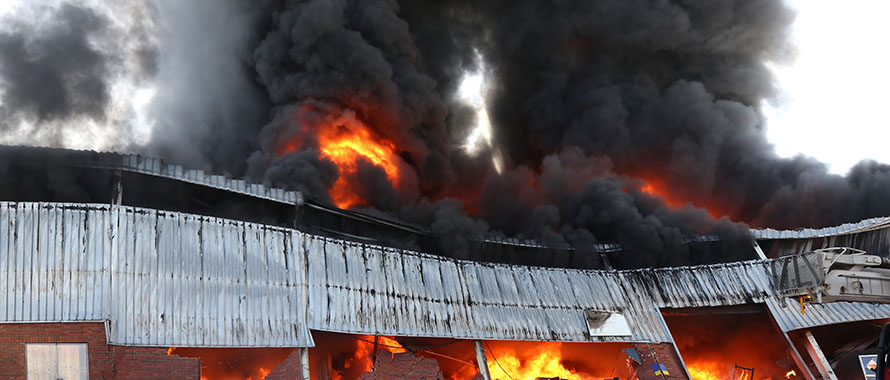Authorities are continuing to investigate a massive warehouse fire March 4 in Clinton Township, Michigan, that caused “hundreds, if not thousands” of explosions and sent debris flying more than a mile from the site. Metal debris that projected from the burning warehouse — which reportedly stored combustible materials associated with vaping — lead to one tragic death of a bystander who was a quarter mile away, injured one firefighter, caused damage to police and fire vehicles, and initially prevented responders from approaching the blaze.
Featured Solutions
“Any time you have a warehouse that has aerosols inside, they basically become like an exploding missile. It creates a huge issue for the fire department because they cannot get close enough,” said Barry Whitton, Managing Director, Broker, Property, Burns & Wilcox Brokerage, Atlanta, Georgia. “Aerosols will often be stored inside of cages or fencing because when they are not contained, what happens in a fire is what happened here — they will explode and spread fire into other areas of the warehouse.”

Anytime you have a warehouse that has aerosols inside, they basically become like an exploding missile. It creates a huge issue for the fire department.
Repair costs and lost income during rebuilding could be covered by a warehouse owner’s Commercial Property Insurance, while any litigation related to the bystander’s death could be covered by Commercial General Liability (CGL) Insurance. Third-party injuries specifically related to pollution caused by the fire — such as fumes due to the vaping products — would require separate coverage under a Pollution Legal Liability (PLL) Insurance policy, said Gina Jones, Vice President, Director, Environmental Programs, Burns & Wilcox, Denver, Colorado.
“This type of lawsuit could cost millions, absolutely millions,” Jones said. “When you are talking about things like vape products, the fumes alone could really make somebody sick.”
Even without the vaping materials, any warehouse fire could bring up environmental claims, said Karim Jaroudi, Manager, Environmental, Burns & Wilcox, Toronto, Ontario. “Those fire suppressant fluids are touching everything that is burning, and they are invariably going to find their way into the subsurface, into the ground, eventually,” he said. “That needs remediation.”
Warehouse owners ‘have to know what is being stored’
According to township officials, Select Distributors was not authorized to store flammable containers at the warehouse that caught fire and violations would have been issued if authorities were aware of the situation, WXYZ Detroit reported. This is a risk many warehouse owners may face, Whitton said.
“You have to know what product is being stored in your warehouse; that is part of your due diligence,” he said, pointing to potential insurance problems down the line. “If this building owner did not know these combustibles were inside, then the insurance company probably did not know that either.”

This type of lawsuit could cost millions, absolutely millions. When you are talking about things like vape products, the fumes alone could really make somebody sick.
Warehouses for the storage of third-party goods are becoming more common, Supply Chain Drive reported last year, with third-party logistics providers leasing more big-box warehouse space in 2022 than any other sector. “We see a lot more of these third-party warehouses being built for third-party goods than we used to. There is always the question of what you are storing in there,” Whitton said, adding that it is not uncommon for insurance carriers to deny coverage when products being stored include fireworks, chemicals or flammables. “Certain carriers are not wanting to insure those higher-hazard products.”
Still, fires pose a significant threat for any warehouse, causing an estimated $283 million in direct property damage per year in the U.S., according to the National Fire Protection Association. In February, a fire destroyed two connected warehouses in Winnipeg, Manitoba, CBC reported. Earlier this month, a warehouse in Baltimore, Maryland, was damaged when a fire started in an unoccupied tractor supply business, causing the roof to cave in, WJZ News reported on March 10.
Following a warehouse fire, a building owner’s Commercial Property Insurance can help pay for repair costs for the structure itself, replacement of contents, and any business interruption costs that may be incurred, for example, loss of rental income from warehouse tenants. For a business owner housing products at a warehouse where a fire occurs, Commercial Property Insurance could cover the cost of new rental space and inventory. “Part of business interruption is extra expenses, which are costs over and above the cost to get up and running quicker,” Whitton explained. “If you could get a product delivered more quickly, you would do that to keep your sales.”
Business interruption coverage is an add-on to a standard policy, he pointed out. “It is something they would choose, and hopefully they decided to do that,” he said.
Hazardous materials intensify warehouse risks
In December of 2023, the Seattle Times reported on concerns from Amazon employees over potentially unsafe chemicals inside of Amazon warehouses, with one employee telling the publication that she once cleaned up a mold remover spill and had not been trained to deal with hazardous materials. In Lancaster, Texas, an ammonia leak at a food warehouse in June of 2023 hospitalized 15 workers, EMS1 reported. In Calgary, Alberta, 20 workers were evacuated from a warehouse in April of 2023 after a chemical spill, according to Global News.
Uncertainty over what is being stored in a warehouse is “the catch-22 when you own a warehouse,” Jones said. “You do not always know what your clients or customers are storing in your warehouse, and that is really why they need to carry Pollution Legal Liability Insurance to protect themself against things they are legally obligated for,” she said, pointing out that even warehouse owners who may not be liable for an incident may still be sued. “You are going to be at least brought into the lawsuit, if nothing else. Our policies can pay to defend you.”
Also known as Environmental Impairment Liability Insurance, PLL Insurance policies are designed to respond to claims over pollutants, which would typically be excluded under CGL Insurance policies. “Anything outside of its natural environment and anything in excess is a pollutant,” Jones emphasized. “If you are storing these hazardous things, you absolutely need that coverage. If there is damage to neighboring entities, or they have to be evacuated, all of that can be covered under a pollution policy.”
Another environmental exposure warehouse owners and operators need should consider is refrigerant leak, Jaroudi said. “If the warehouse owner/operator stores sensitive materials for others, or rents out storage space for items like food, then, depending on the floor plan and measures in place, a refrigerant leak could render the entire said sensitive stock unsafe to use and hence destroyed,” he said, adding, “This would be a major cost and is another example why environmental insurance is important for warehouse owners and operators to consider.”

Virtually any premise has an environmental exposure.
In addition to legal defense, covered expenses can include onsite cleanup costs, offsite cleanup costs, and third-party property damage and bodily injuries. In the recent Michigan warehouse fire, for example, individuals could claim they suffered negative health effects due to fumes from the blaze. “Somebody who breathes the fumes and is allergic to vaping products could get sick” and sue the warehouse owner, she said.
‘Virtually any premise’ is at risk for environmental claims
Cleanup after a pollution event can be extremely expensive, according to Jaroudi, and often involves soil and groundwater cleanup. In some cases, a pollution event can be caused by a neighboring business but still require action. “Sometimes it doesn’t even matter what you do, you could still be impacted or in turn impact your neighbor,” Jaroudi said. “Everybody has an inherent environmental exposure.”
Despite the risks, there is “very little awareness” of the need for pollution coverage among warehouse owners, Jones explained. “Every single client has an environmental exposure and often they do not know it or they do not think they would be responsible” for a claim, she said. “It is really important to insure against that, if nothing else but for your own peace of mind and for the defense costs.”
Jaroudi agreed, noting that even warehouses that do not store any hazardous or flammable materials can emit fumes in the event of a fire. “Warehouse owners may say they do not have a chemical process, or they are not manufacturing,” but they are still at risk, he said. “This is one of the recurring conversations in my industry. Virtually any premise has an environmental exposure.”









